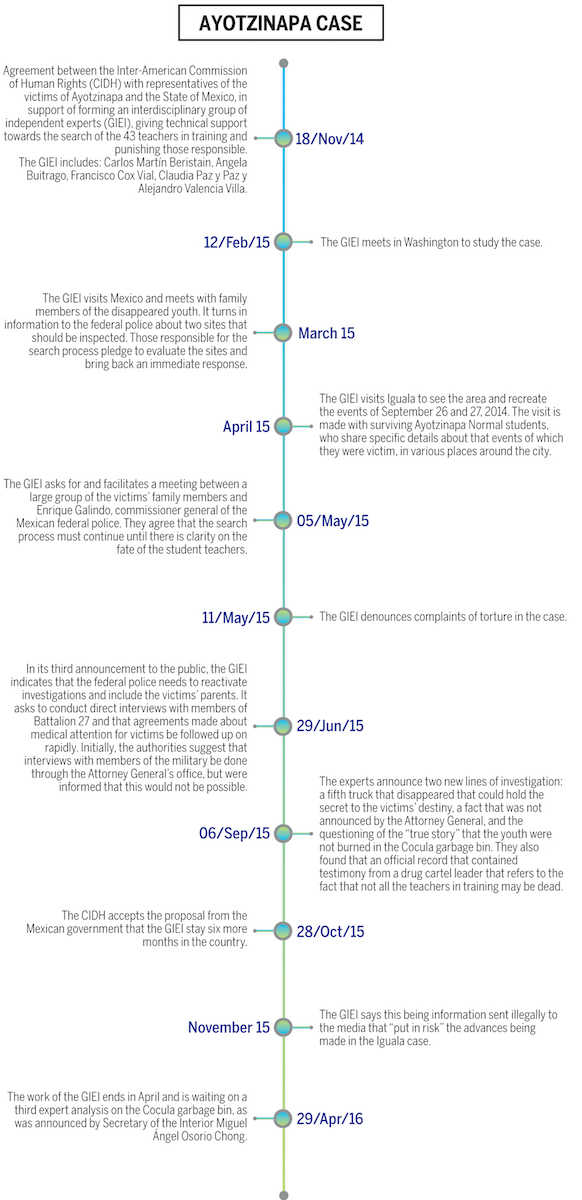The Inter-American Commission of Human Rights (CIDH) denounced the fact that there has been a discrediting campaign aimed at the interdisciplinary group of independent experts (GIEI), and against its executive secretary Emilio Álvarez Icaza.
Through a press communication, the Commission disparaged allegations of a preliminary investigation being open against Álvarez Icaza on counts of fraud.
The denouncement, presented by the president of the Citizen Council for Public Security and Penal Justice organization and the president of Citizen Watch, José Antonio Ortega and Rafael Herrera Piedra, respectively, said that Álvarez Icaza had not committed the crime of fraud against the state “unless there has been some error on our side.”
The CIDH clarified that Álvarez Icazu signed an agreement of cooperation with Mexico on behalf for the General Secretariat of the Organization of American States.
Ante denuncia temeraria e infundada, expresamos confianza en la probidad del Secretario Ejecutivo @EmilioAlvarezI https://t.co/UQyuZvq2TG
— CIDH (@CIDH) 29 de marzo de 2016
The commission underlined that, in accordance with the rules of the Member States Offices (OEA) the financial contribution for the development of the jobs that the Mexican state return were voluntary and deposited directly to the accounts of the organization’s secretary general. They said there was no management of economic resources on the part of the Inter-American Commission of Human Rights of by its executive secretary.
For this reason, the group considers the preliminary investigation inadmissible that is at the base of this accusation, which they qualify as bold and unfounded.

Ortega Sánchez was a founding member of Mexico United Against Delinquency, but abandoned the group, arguing differences of criteria with other group members, who decided to work with the Office of Prevention of Crime and Participation of the Community of the Secretary of Public Security, during the administration of Vincente Fox. Nonetheless, other versions say that there were discrepancies with the group members because of his excessive eagerness to embody ultra-right, conservative views of the PAN sub-group called el Yunque.
Media published on June 20, 2004, that alongside Guillermo Velasco Arzac, Ortega Sánchez tried to infiltrate a march held by Mexico United Against Delinquency at the request of the family and friends of Vincente and Sebastián Guitiérrez Moreno, kidnapped and assassinated in May of this year.
In accordance with these articles, Velasco Arzac and Ortega Sánchez tried to politically manipulate Mexico United Against Delinquency, which was started in 1997 after the murder of the son of Josefina Ricaño de Nava, who was one of the four people who received the go-ahead from the Supreme Court to consume marijuana in November last year.
Capital Media attempted to get an interview with experts to learn their opinion about these accusations against Ortega Sánchez, but the press department of the GIEI said there were no declarations and that investigators were working on their work regarding the Ayotzinapa 43, which they are are on deadline to present on or before April 30.
Conocer el proyecto de vida de los jóvenes y sus familias es clave para valorar el daño y las mejores medidas de atención a las víctimas.
— GIEI Ayotzinapa (@GIEIAYOTZINAPA) 29 de marzo de 2016
The Secretary of the Interior, Miguel Ángel Osorio Chong, in a radio interview, said that the GIEI would conclude its work in April and that it had not opened any lines of investigation nor conclusions that were any different than those arrived at by the Attorney General.
The independent experts refused to comment on these assertions. “They are focused on the work and on the report they have to deliver in April. If they were interested in saying something we would bring it to the attention of the press,” said Cecilia Navarro, who is in charge of media relations for the GIEI.
Capital Media also tried to get a direct response from the office of the executive secretary of the Inter-American Commission of Human Rights, Emilio Álvarez Icaza Longoria, but did not receive an immediate response.
In an agreement signed in 2014 by the Mexican government with the Inter-American Commission of Human Rights, the selection of the five experts that comprise the GIEI was established. The Secretaries of External Relations, of the Interior, and the Attorney General ratified the names.
The GIEI was to work for a period of six months on the following goals: the analysis of the search for the disappeared persons and recommendations for a more efficient investigations; a technical analysis of the lines of investigation to determine penal responsibilities; and a technical analysis of the Plan for Integral Attention to the Victims.
The GIEI presented its first investigation report and conclusions September 6, 2015. On this date and at the behest of the federal government and the representatives of the victims, the group’s mandate was renewed for an additional period of six months, which end April 30.
In its report, the GIEI questions “the real truth”, sustained by the Attorney General Jesús Murillo Karam, saying that the Ayotzinapa 43 were burned in a garbage bin in the municipality of Cocula. Thanks to this, new lines of investigation were opened.










